Osmania University
| ఉస్మానియా విశ్వవిద్యాలయము جامعہ عثمانیہ | |
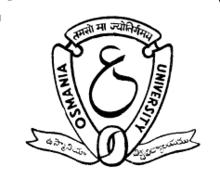 | |
| Latin: Universitas Osmanii | |
| Motto |
Telugu: తమసోమా జ్యోతిర్గమయ Sanskrit: तमसो मा ज्योतिर्गमय |
|---|---|
Motto in English | Lead us from Darkness to Light |
| Type | Public |
| Established | 1918 |
| Founder | Ross Masood |
| Chancellor | ESL Narasimhan Governor of Telangana |
| Vice-Chancellor | Professor S. Ramachandram[1] |
| Address | Osmania University, Hyderabad, Telangana, India |
| Campus | Urban, 1600 acres (6 km²) |
| Affiliations | UGC, NAAC, AIU |
| Website | Osmania University |
Osmania University is a public state university located in Hyderabad, India, founded in 1918 with the help of chief Architect of Mahbub Ali Khan - Nawab Sarwar Jung.[2] It was established and named after the seventh and last Nizam of Hyderabad, Nawab Mir Osman Ali Khan. It is the third oldest university in southern India, and the first to be established in the erstwhile princely State of Hyderabad.[3][4][5] It is the first Indian university to have Urdu as a medium of instruction.[2] In 2012, the university was placed sixth among the nation's premier universities in Humanities, Sciences and Commerce stream, which secured the University with Potential for Excellence status.[6]
The Main Campus is ranked tenth among state universities, as published by India Today.[7] As of 2012, the university hosts 3,700 international students from more than 80 nations.[8] The OU is one of the largest university systems in the subcontinent with over 300,000 students on its campuses and affiliated colleges. It is particularly known for its faculty of Engineering and Technology, Law, Arts, Sciences, Commerce and Management departments. Osmania Medical College was once a part of the university.[9] However, it is now under the supervision of NTR University of Health Sciences.[10]
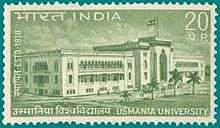
History
Establishment
A plan to establish a university in Hyderabad state was initiated in 1884. Wilfred Sewen Blunt, a British educationist, prepared a proposal and presented it to the Nizam of Hyderabad on 24 January 1884.[12] The official decree was issued on 17 August 1917 for the establishment of Osmania University.[13] Inaugurated in 1918, the university has functioned since 28 August 1919, with an initial enrollment of 225 students. Within the first decade of its establishment, medicine and engineering faculties were started in 1927 and 1929, which were accredited throughout the Indian subcontinent. The university college for women was initiated in 1926, and in 1936 the arts college was started.[12][13][14]
The university was established to cater to modern, secular, cultural, Islamic and regional arts education, for which the medium of instruction was selected as Urdu and English as a compulsory language, making it the first university in the Indian subcontinent to provide education in native and Urdu language.[12][14][15][16] The Translation Bureau and Publication section was formed, which collected foreign and regional language textbooks along with literature, sciences and other artworks from the world and translated them into the Urdu language.[12][17]
Main campus
The main campus is a chief intellectual centre in Hyderabad, and its alumni and faculty members include many distinguished individuals, including former Prime Minister of India P. V. Narasimha Rao. Admission to the main campus departments of Psychology,Genetics, Biochemistry, Chemistry, Engineering, Management, and Law is highly competitive.[18]
The state government has appointed Prof S Satyanarayana as vice chancellor of the university.
The University is accredited by the NAAC with an 'A' grade and conferred with the status of 'University with Potential for Excellence' by the UGC, New Delhi.[6]
The university colleges are located within the main campus of the university. There are eight such colleges: the University College of Arts and Social Sciences, University College of Commerce & Business Management, University College of Technology, University College of Engineering, University College of Law, University College of Science, Institute of Advance Study in Education, and PG College of Physical Education.
The university offers courses in humanities, arts, sciences, social sciences, law, engineering, medicine, technology, commerce and business management, information technology and Oriental languages.
In 2001, Osmania was awarded five-star status by the National Accreditation and Assessment Council (NAAC) of the University Grants Commission, part of the Government of India.[19]
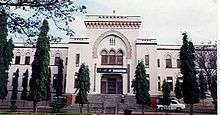
The university has a campus of nearly 1600 acres (6 km²) with 300,000 students (counting all the campuses, constituent affiliated colleges and district centres), making it one of the largest higher education system in India. It is home to nearly 300,000 students pursuing their higher studies. It attracts students from across the nation as well as from other countries.[22] Nearly 5000 faculty and staff are employed at Osmania.[23]
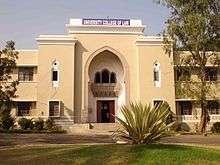
Admissions and research
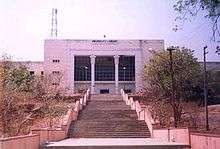
Osmania is a non-profit university which is funded and managed by the government. Admissions into the Bachelor of Engineering, Masters and Doctoral programs in the main campus is on a merit basis, evaluated by national entrance examinations (such as the EAMCET, GATE, BCFSBTGMES-N&D, APLAWCET, or O.U. PhD Entrance Exam) for each of the courses offered. The research activities are funded by various autonomous agencies of the government of India.
Library
The University Library is the main library of the university and it was founded in 1918 along with the university. It has close to 500,000 books and more than 6000 manuscripts, which include rare palm leaf manuscripts. It also has various journals and government documents. The main library coordinates a library system, which connects the libraries in the entire campus and other constituent college libraries.[25]
Constituent centers of the main campus
Osmania University is a confederation of university colleges, constituent colleges, and affiliated colleges. The constituent colleges of the university includes various colleges, including Nizam College and University College for Women.[26] Nizam College was established in 1887 and was part of the University of Madras for 60 years; the college was made a constituent college of Osmania on 19 February 1947.[27]
- University College for Women, Koti
- University College of Science, Saifabad, Hyderabad
- Post Graduate College, Secunderabad
- Post Graduate College of Law, Basheerbhagh
- Institute of Genetics and Hospital for Genetic Diseases
- Sir Ronald Ross Institute of Parasitology
- Center For Energy Technology
- Educational Multimedia Research Center
- Center For English Language Training
Other autonomous centers
- Institution of Electronics and Telecommunication Engineers, Hyderabad
- Indian Council of Social Science Research, Hyderabad
- Center For Plant Molecular Biology
- Center For Indian Ocean Studies
- Japal-Rangapur Observatory
- Research and Training Unit in Navigational Electronics
- Regional Center For Urban and Environmental Studies
- National Institute of Nutrition
- City College Hyderabad
- Center For Stem Cell Science, Hyderabad
- Anwar Ul Uloom College, Hyderabad
- PGRR center for distance education
Affiliated colleges
The affiliated colleges of the university are scattered in Hyderabad district and offer various undergraduate and post-graduate courses.[28] There are over four hundred colleges affiliated to Osmania University. They operate in conjunction with Osmania University, but they all have separate rules and criteria to be admitted into them.
Departments
|
|
Notable alumni and faculty
Notable alumni of Osmania University include major politicians of India, including the ninth Prime Minister of India P. V. Narasimha Rao[18] and 16th and last Chief Minister of united Andhra Pradesh with Telangana Nallari Kiran Kumar Reddy, Keshavrao Sonawane Co-operative minister of Maharashtra State,current CEO Adobe systems Shantanu Narayen and senior advocate Subodh Markandeya. Ravi V. Bellamkonda, a distinguished biomedical engineer, the president of American Institute for Medical and Biological Engineering, and the recently appointed dean of Pratt School of Engineering at Duke University also is an Osmania graduate. [29] Other alumni include former Indian cricket team captain Mohammed Azharuddin, cricket commentator Harsha Bhogle, novelist Venkatesh Kulkarni, PDSU founder George Reddy, former Union Home Minister Shivraj Patil, software tester Shaikh Moulali, former Governor of the Reserve Bank of India Yaga Venugopal Reddy, chemist Garikapati Narahari Sastry, metallurgist and former Vice Chancellor of Banaras Hindu University Patcha Ramachandra Rao and physicist Raziuddin Siddiqui. Rakesh Sharma, cosmonaut and the first Indian to travel in space, was a graduate of Osmania.[30] Karan Bilimoria, founder of Cobra Beer, Member of the House of Lords, and the seventh Chancellor of the University of Birmingham earned his Bachelor of Commerce degree from Osmania in 1981.[31] Notable former faculty members of the university include Bhadriraju Krishnamurti, Dravidianist and linguist, and founder of linguistics department at the university, physicist Suri Bhagavantam, eminent linguist Masud Husain Khan, and Pulavar (Vidwan) P. Velliangiri, Emeritus professor of Tamil.
See also
References
- ↑ Professor S. Ramachandram
- 1 2 Roger L. Geiger (2009). Curriculum, accreditation, and coming of age of higher education. Transaction Publishers. pp. 154–155. ISBN 978-1-4128-1031-9. Retrieved 16 October 2011.
- ↑ "H.E.H. Nizam Mir Osman Ali Khan" (PDF). Retrieved 2012-08-21.
- ↑ History oucde.ac.in
- ↑ "INSA". Insaindia.org. Retrieved 2012-08-21.
- 1 2 "Osmania University ranked 6th among top ten universities" (PDF). Retrieved 2012-08-21.
- ↑ "India's top 50 universities - | Photos | India Today |". Indiatoday.intoday.in. Retrieved 2012-08-21.
- ↑ "Hyderabad: Osmania University tells foreign students to keep off drugs". ibnlive.in.com. Retrieved 2012-09-01.
- ↑ "About OMC". Osmania Medical College. Retrieved 3 October 2013.
- ↑ "Affiliated University". Osmania Medical College. Retrieved 3 October 2013.
- ↑ "A slice of Egypt in Hyderabad". Chennai, India: hindu.com. 14 February 2011. Retrieved 12 December 2011.
- 1 2 3 4 Kate, P.V (1987). Marathwada Under the Nizams, 1724-1948. Mittal Publications. p. 132-133. ISBN 9788170990178. Retrieved 18 November 2015.
- 1 2 Jaganath, Santosh (2013). The History of Nizam’s Railways System. Laxmi book publication. p. 44-45. ISBN 9781312496477. Retrieved 18 November 2015.
- 1 2 Sherman, Taylor.C (2015). Muslim Belonging in Secular India. Cambridge University Press. p. 76-77. ISBN 9781107095076. Retrieved 18 November 2015.
- ↑ Arthur, James (2006). Faith and Secularisation in Religious Colleges and Universities. Routledge. p. 19-20. ISBN 9781134241125. Retrieved 18 November 2015.
- ↑ Ridgeon, Lloyd (2015). Sufis and Salafis in the Contemporary Age. Bloomsbury Publishing. p. 150-151. ISBN 9781472532237. Retrieved 18 November 2015.
- ↑ Geiger, Roger L (2011). Curriculum, Accreditation, and Coming of Age in Higher Education: Perspectives on the History of Higher Education. 1. Transaction Publishers. p. 15-16. ISBN 9781412815260. Retrieved 20 November 2015.
- 1 2 "P. V. Narasimha Rao – A Profile". Indian PM's official website. Archived from the original on 2009-03-28.
- ↑ Team indiaresultszone.com (2007-11-25). "Ranking of University | India". Indiaresultszone.com. Retrieved 2012-08-21.
- ↑ "Overall Ranking of Top Engineering Colleges" (PDF). Retrieved 2012-08-21.
- ↑ Special Correspondent (2012-07-23). "Cities / Hyderabad : Osmania University computer science students placed high". Chennai, India: The Hindu. Retrieved 2012-08-21.
- ↑ Aarti Dhar (2012-07-15). "News / National : Still a small global campus". Chennai, India: The Hindu. Retrieved 2012-08-21.
- ↑ "About Osmania University". Osmania University. Retrieved 3 October 2013.
- ↑ "Outlook Rankings: NALSAR, Hyderabad ranked the best law school in the country; followed by NLSIU, Bangalore and NLIU, Bhopal". Barandbench.com. Retrieved 2012-08-21.
- ↑ "University Library". Osmania University. Retrieved 3 October 2013.
- ↑ "List of Colleges under Osmania University Jurisdiction". Osmania University. Retrieved 1 October 2013.
- ↑ "History". Nizam College. Retrieved 1 October 2013.
- ↑ "Affiliated Colleges List Under Osmania University". Osmaina University. Retrieved 1 October 2013.
- ↑ "Duke names new Engineering Dean". Duke Today. Retrieved 26 January 2016.
- ↑ "Nizam College fete from tomorrow". The Hindu. 19 February 2008. Retrieved 1 October 2013.
- ↑ "Lord Bilimoria appointed as Chancellor of the University of Birmingham". Birmingham University. Retrieved 17 December 2014.
External links
| Wikimedia Commons has media related to Osmania University. |
- Official website
- Osmania University Partner website* Osmania University Alumni Association (OUAA) North America
- History of Osmania University, Hyderabad and alumni
- Osmania University summarized details
Coordinates: 17°24′40″N 78°31′44″E / 17.411°N 78.529°E